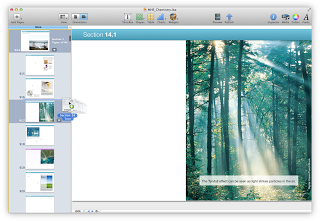iBooks Author Update

So my initial reaction to the release of iBooks Author yesterday was essentially one of frustration. What at first appeared to be a reasonably decent - even exciting - application for creating ebooks for the iBooks platform was quickly rendered mute by its virtual unavailability to the vast majority of computer users, including me. So utterly idiotic was Apple's decision to make this a Mac-only app that it completely overshadowed all other considerations at the time. It just seemed so plainly obvious to me when advance reports began to leak of Apple's intention to seriously compete in the ebook market that the only logical move that made any sense at all to me would be to open up the iBooks platform to a wider audience of content creators as Amazon have done so successfully.
But Apple's intention was, in fact, to make content creators come to them, and not the other way around at all. The astounding stupidity of this is just mind-boggling beyond belief. To think you have that kind of clout when you hold less than 5% of the market you're aiming at is one of the most misguided business notions I have ever heard (and there has certainly been plenty of stupidity in the business world of late). To create a product almost no one can use and expect it to somehow alter the fabric of reality is just complete insanity.
What I hadn't really given due consideration to was the fine print in the end user licensing agreement, which stipulates quite clearly that any content created using iBooks Author can only be sold via the iBookstore: that is, not on Smashwords, not on your own website, not anywhere else...ever. Like many (if not most) potential users I more or less blew this off. Since an iBook can only be read on an iOS device it didn't seem to make all that much difference, as the iBookstore is obviously the best place to sell that content. After all, you can purchase Kindle ebooks all over the place, but the place most readers purchase them is right on their Kindle. Why not the same for iBooks? The difference, of course, is that Amazon does not require you to sell Kindle ebooks on the Kindle, or even on Amazon at all, and aside from the exclusive Library Lending program, you're free to sell them anywhere.
But Apple are taking a different tack entirely, one that might be called totalitarian by some, and just plain dumb by any moderately educated business analyst. Perhaps they think that just because they've made the application free people will rush out and buy their relatively overpriced hardware in droves so that they can use it. And maybe they're right. But I highly doubt it.
The more real and serious implications of this move were pointed out quite clearly in a post by Dan Wineman over at Venomous Porridge yesterday, which boil down to the fact that Apple are in essence claiming sole rights to all output from its software, not just to the use of the software itself. This has vast legal implications for creative content beyond just this instance, which could set a precedent for digital content that might have lasting repercussions that are difficult to reverse. More importantly, it has immediate and practical implications for authors who want to retain full rights and control of their work. If you create content via iBooks Author then Apple gain sole and final distribution rights to that work. One can only imagine the lawsuits just waiting in the wings the first time an iBooks release becomes a million seller and that author wants to add the book to other platforms, or sign with a traditional publisher for worldwide publication rights.
As I mentioned yesterday, I had ordered a Mac Mini in order to upload my content to the iBookstore. Today I cancelled that order. Not only that, but I've started writing a tutorial on how to create your own fixed layout iBooks using a template I have uploaded to my website. I'll post the first part tomorrow, and continue so long as there is interest.

Published on January 20, 2012 18:47
No comments have been added yet.



